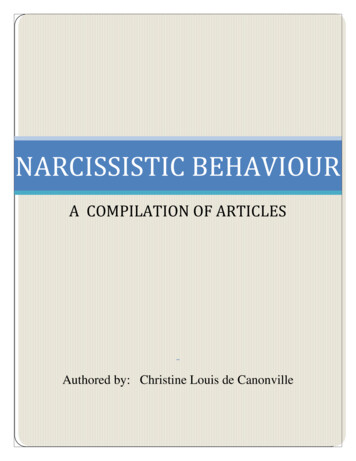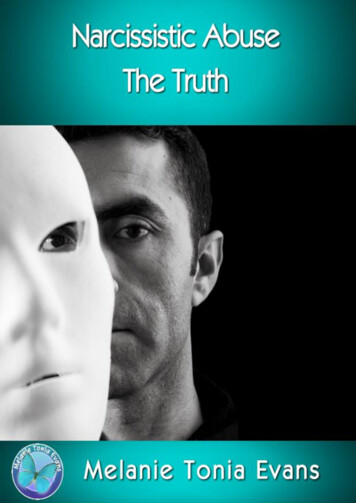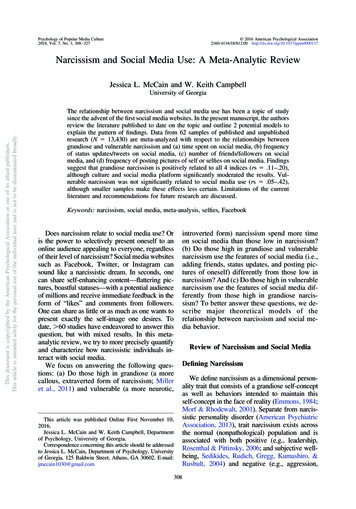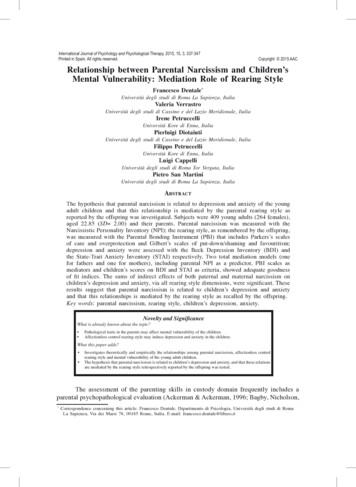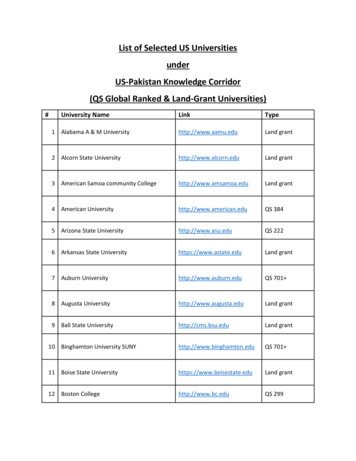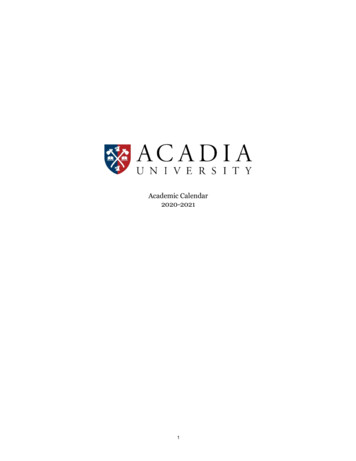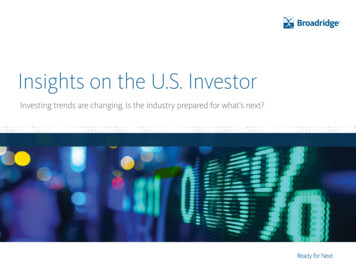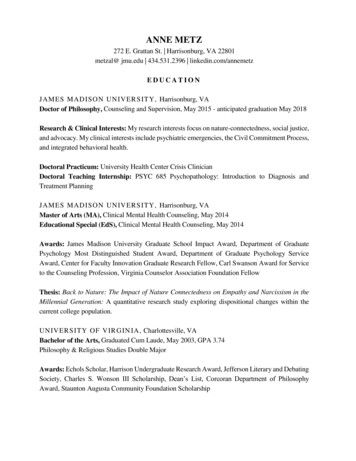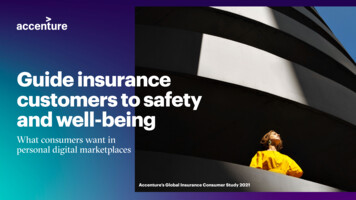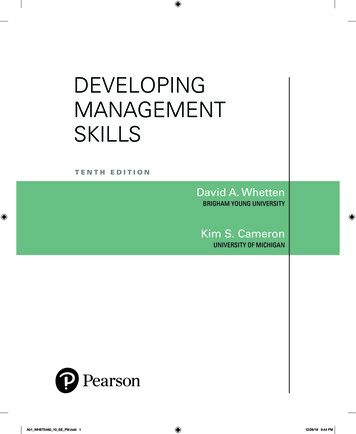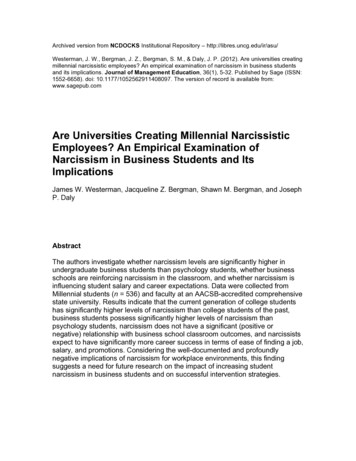
Transcription
Archived version from NCDOCKS Institutional Repository – http://libres.uncg.edu/ir/asu/Westerman, J. W., Bergman, J. Z., Bergman, S. M., & Daly, J. P. (2012). Are universities creatingmillennial narcissistic employees? An empirical examination of narcissism in business studentsand its implications. Journal of Management Education, 36(1), 5-32. Published by Sage (ISSN:1552-6658). doi: 10.1177/1052562911408097. The version of record is available from:www.sagepub.comAre Universities Creating Millennial NarcissisticEmployees? An Empirical Examination ofNarcissism in Business Students and ItsImplicationsJames W. Westerman, Jacqueline Z. Bergman, Shawn M. Bergman, and JosephP. DalyAbstractThe authors investigate whether narcissism levels are significantly higher inundergraduate business students than psychology students, whether businessschools are reinforcing narcissism in the classroom, and whether narcissism isinfluencing student salary and career expectations. Data were collected fromMillennial students (n 536) and faculty at an AACSB-accredited comprehensivestate university. Results indicate that the current generation of college studentshas significantly higher levels of narcissism than college students of the past,business students possess significantly higher levels of narcissism thanpsychology students, narcissism does not have a significant (positive ornegative) relationship with business school classroom outcomes, and narcissistsexpect to have significantly more career success in terms of ease of finding a job,salary, and promotions. Considering the well-documented and profoundlynegative implications of narcissism for workplace environments, this findingsuggests a need for future research on the impact of increasing studentnarcissism in business students and on successful intervention strategies.
Three of the defining descriptors often affixed to the Millennial Generation(those born between 1977 and 2000) are that they are narcissistic andself-involved and that they project a profound sense of entitlement. Recentarticles in the popular press are reinforcing the perception of increasingnarcissism among Millennials, including a Newsweek story on the“narcissism epidemic” titled “Generation Me” (Kelley, 2009), which statesthat “we’ve created a generation of hot-house flowers puffed with adisproportionate sense of self- worth.” And there are increasing concernsthat narcissistic employees are having a negative impact on business inthe United States and have even been argued to represent one of the rootcauses of the global financial crisis, as discussed in a recent article inBloomberg, “Harvard Narcissists with MBAs Killed Wall Street” (Hassett,2009).There is evidence that narcissism levels have significantly increasedamong U.S. college students over the past 25 years (Twenge, Konrath,Foster, Campbell, & Bushman, 2008). An increase in narcissism amongthe Millennial Generation raises numerous potential issues for highereducation, as detailed in Bergman, Westerman, and Daly (2010). Forexample, narcissists often dis- play a surprising sense of entitlement andinflated expectations. A 2008 survey of college students found a significantpositive relationship between narcissism and academic entitlement, with66% of students surveyed believing that their professor should give themspecial consideration if they explained that they were trying hard(Greenberger, Lessard, Chen, & Farruggia, 2008). In that same survey,nearly a quarter believed that their professor should lend them his/hercourse notes if they ask for them. Additionally, individuals higher innarcissism often display hypersensitivity to evaluation and potentialcriticism (Beck, Freeman, & Associates, 1990; Bushman & Baumeister,1998) and are likely to be very poor team players as they tend to blameothers for failure, take credit for success, and are overly competitive(Campbell, Reeder, Sedikides, & Elliot, 2000). Furthermore, there isindirect support for the contention that these increases may be even morepronounced among business students in comparison with those in otherdisciplines (e.g., Robak, Chiffriller, & Zappone, 2007).However, what may be especially enigmatic for business school educatorsis that narcissism may have some benefits for transitory or temporary workenvironments similar to the higher education classroom (Bergman et al.,2010). Narcissists tend to have higher self-esteem, are more extraverted(e.g., Emmons, 1984), have increased short-term likeability (Oltmanns,Friedman, Fiedler, & Turkheimer, 2004; Paulhus, 1998), show enhancedperformance on public evaluation tasks (Wallace & Baumeister, 2002), and
demonstrate emergent leadership (Blair, Hoffman, & Helland, 2008;Brunell, Gentry, Campbell, & Kuhnert, 2006; Galvin, Waldman, &Balthazard, 2010; Resick, Whitman, Weingarden, & Hiller, 2009). It ispossible, then, that narcissists may have some advantage in the businessschool classroom, where during relatively short academic sessions (a fewmonths), assertiveness, talkative- ness, and overt confidence areencouraged and rewarded. As a result, it is possible that narcissists maybe graded or assessed at a higher level than less narcissistic students inthe classroom.In a broader sense, if the product of higher education in business includesdisproportionately higher levels of narcissism among our graduates, thismay be particularly problematic for the business community. High levels ofnarcissism have been associated with substantially negative behaviors ofparticular importance to employing organizations including white-collarcrime (Blickle, Schlegel, Fassbender, & Klein, 2006), assault (Bushman,Bonacci, van Dijk, & Baumeister, 2003), aggression (Bushman &Baumeister, 1998), distorted judgments of one’s abilities (Paulhus, Harms,Bruce, & Lysy, 2003), rapidly depleting common resources (Campbell,Bush, Brunell, & Shelton, 2005), risky decision making (Campbell, Goodie,& Foster, 2004), and alcohol abuse (Luhtanen & Crocker, 2005).Furthermore, as managers, narcissists are likely to build toxic,unproductive work environments (Lubit, 2002).In summary, a rising tide of narcissism would present significant problems for organizations, their productivity, and long-term viability.Considering the mounting evidence pointing to significant increases innarcissism among Millennials (Twenge et al., 2008), we must beginempirically investigating the impact this rise in narcissism may have on thisgeneration.This research represents the first study to examine whether businessschools have high levels of narcissism among their students. We presentresults on data collected from 536 undergraduates in the SoutheasternUnited States. We first explore whether narcissism levels are elevated incomparison with historical averages and whether narcissism is significantlyhigher in business students than in psychology students. We then examinewhether business schools are rewarding and reinforcing narcissism in theclassroom and investigate the relationship between narcissism and studentsalary and career expectations. We conclude by discussing theimplications of our results for higher education and business.
Narcissism and the Millennial GenerationIt is important to note that as we discuss narcissism among the MillennialGeneration, we are referring to a normal, nonclinical personality trait. Weare not suggesting that this generation suffers disproportionately from aclinical personality disorder (i.e., Narcissistic Personality Disorder;American Psychiatric Association, 2000). Substantial research bypersonality and social psychologists has established subclinical narcissismas a personality trait that normal, healthy individuals possess to varyingdegrees (e.g., Campbell et al., 2005; Emmons, 1987; Rhodewalt & Morf,1995; Watson, Grisham, Trotter, & Biderman, 1984), and it is this normalpersonality trait that we examined in this study. Subclinical narcissismappears quite similar to its clinical counterpart; it simply appears to a lesserdegree. Thus, like clinical narcissists, “normal” narcissists (referred tosimply as “narcissists” from this point) hold an extremely positive, eveninflated, view of themselves; believe they are special and unique; andexpect special treatment from others while believing they owe little ornothing in return (American Psychiatric Association, 2000; Millon, 1996).Although narcissists lack empathy and have few, if any, closerelationships, they strongly desire social contact, as social contacts are aprimary source of admiration and attention. Because narcissists are unableto regulate their own self-esteem, they must rely on external sources foraffirmation (Campbell, Rudich, & Sedikides, 2002; Morf & Rhodewalt,2001). Thus, narcissists engage in a variety of strategies aimed to maintaintheir inflated egos, such as exhibitionism and attention- seeking behavior(Buss & Chiodo, 1991), dominance and competitiveness in socialsituations (Emmons, 1984; Raskin & Terry, 1988), anger and selfenhancing attributions in response to criticism (Farwell & Wohlwend-Lloyd,1998), and derogation of those who provide threatening feedback (Kernis& Sun, 1994).The origins of narcissism in the Millennial Generation are unclear.However, it is likely that some combination of parenting and cultural orsocietal conditioning is responsible. Millon and colleagues (Millon, 1996;Millon & Davis, 2000) suggest a social learning theory perspective, in thatspecial treatment and overindulgence by parents have resulted in thisgeneration of children valuing themselves independent of real attainments,resulting in enhanced expectations for automatic admiration and praise.Those taking a cognitive theory perspective (e.g., Beck et al., 1990;Young, 1998) believe narcissistic tendencies have emerged fromexcessively idealizing parents who caused their children to developoveractive self-schemas that include inflated beliefs of personaluniqueness and self-importance. Parents may also systematically deny or
distort negative external feedback to their children, and insulation fromsuch feedback could reinforce and strengthen narcissistic tendencies.Baker, Comer, and Martinak (2008) lament this generation’s pervasive incivility and sense of entitlement in academia and beyond and note dotingstyles of parenting as a potential cause. Other researchers have proposedthat Western society’s shift toward materialism and individualism may havecontributed to increases in narcissism (Lasch, 1978; Twenge, 2006).Meisel and Fearon (2007) argue that generational cohorts possess explicittacit knowledge that is contextually and culturally derived and note a needfor management educa- tors to improve cross-generational understanding.However, the origins of narcissism are speculative, and the reality ofenhanced (or reduced) narcissism in business students is currentlyunknown.We first examine whether our sample of Millennials has a mean narcissism level significantly higher than historical averages. Twenge et al.(2008) conducted a cross-temporal meta-analysis of 85 samples ofAmerican college students and found that narcissism levels have risenover the generations captured between 1979 and 2006. Specifically, theyfound that scores on the Narcissistic Personality Inventory (NPI—the mostwidely used measure of subclinical narcissism; Raskin & Hall, 1979, 1981;Raskin & Terry, 1988) were positively related to the year of data collection,with students in 1982 having a mean NPI score of 15.02 and students in2006 having a mean NPI score of 17.29. Thus, by historical standards, weexpect our 2009 sample of college students to have an elevated mean NPIscore consistent with the findings of a progressive increase over time.Hypothesis 1: The mean narcissism level of the present sample will besignificantly higher than historical averages.Narcissism and the Business StudentAlthough narcissism levels have not been explicitly examined in businessstudents, research has found that narcissistic tendencies such asmaterialistic values and money importance tend to be enhanced inbusiness students (e.g., Robak et al., 2007; Vansteenkiste, Duriez,Simons, & Soenens, 2006). Robak et al. (2007) found that businessstudents were more motivated to make money than students with apsychology major and were subject to more negative mood states, such asanger and depression, which may also result from high narcissism.Similarly, in a comparison of education and business university students,Vansteenkiste et al. (2006) found that business majors more strongly
endorsed extrinsic values (with a particular emphasis on personal financialsuccess), displayed lower levels of well-being, showed more signs ofinternal distress, and had more substance abuse problems than dideducation students. In addition, the Vansteenkiste et al. (2006) studyindicated that the differences in self-reported well-being and substance usebetween business and education students were fully explained by the typeof values with which each group was primarily concerned (businessstudents cited wealth accumulation, and education students cited helpingpeople in need). Based on this previous research, we wished to directlyexamine the levels of narcissism among business students versusstudents in a more “helping- oriented” discipline, namely, psychology. Thiscomparison seems particularly relevant since most of the previous studieson subclinical narcissism (and the majority of those included in the recentmeta-analysis; Twenge et al., 2008) used samples of psychology students.If narcissism levels are rising among students in a helping-orienteddiscipline such as psychology, and the level of narcissism amongMillennial business students is even higher, this may support the public’sgrowing concern regarding the impact of narcissism on U.S. businesses.Some research also indicates significant gender differences in narcissism,with men typically scoring higher on the NPI than women (e.g., Bushman &Baumeister, 1998; Farwell & Wohlwend-Lloyd, 1998; Twenge et al., 2008).However, this gender gap appears to be rapidly closing, as between 2002and 2007 women were developing narcissistic traits at four times the rateof men (Irvine, 2009). Furthermore, we suspect that the percentages ofmen versus women differ substantially between business and psychologydisciplines, with business students being predominantly male. Therefore,we also explore whether any significant difference between disciplines isthe result of a difference in the gender composition of our samples.Overall, we assert that, although gender differences are likely to exist inoverall levels of narcissism, being a business student would be a moresignificant driver of narcissism than gender.Hypothesis 2a: Business students will have significantly higher levels ofnarcissism than psychology students.Hypothesis 2b: Narcissism will be significantly higher in business schoolstudents than in psychology students, controlling for gender.
Narcissism and Business Student Classroom PerformanceIf narcissism levels are significantly higher in business students than in students of other disciplines, then we may be essentially graduating futurebusi- ness leaders who are more entitled, more exploitative, and lessempathic. Therefore, we investigate the possibility that business schoolsare reinforcing narcissism in the classroom. As discussed earlier,narcissism may have some short-term benefits in a classroomenvironment. Narcissists possess short- term likeability, show enhancedperformance on public evaluation tasks, focus on short-term victories incompetitive tasks, are more extraverted, and demonstrate emergentleadership (Blair et al., 2008; Campbell et al., 2005; Emmons, 1984;Oltmanns et al., 2004; Paulhus, 1998; Wallace & Baumeister, 2002).Short-term likeability, emergent leadership, and enhanced performance onpublic evaluation tasks may be rewarded in classroom presentations. Theclassroom also consists of a short-term competitive environment, whichmay motivate more narcissistic students toward achieving “victory” orbetter grades than their classmates. It is possible, then, that narcissistsmay have some advantage in the business school classroom. A previousstudy (Farwell & Wohlwend-Lloyd, 1998) found no relationship betweennarcissism and course grades among undergraduate psychology students;however, given that we expect to find significant differences betweenbusiness students and psychology students, we examine the significanceof this relationship for Millennial business students.Hypothesis 3: Business students higher in narcissism will have enhancedclassroom performance in terms of class attendance and final coursegrades.Narcissism and Inflated BusinessStudent Career ExpectationsPerhaps most directly related to the concerns voiced by the media andmany employers is the issue of narcissistic entitlement and expectations.As dis- cussed previously, numerous recent articles and surveys have ledto the Millennial generation being characterized as self-involved andentitled (e.g., Hassett, 2009; Kelley, 2009). Entitlement represents one ofthe primary components of narcissism (both clinical and subclinical;American Psychiatric Association, 2000; Emmons, 1984), which, simplyput, means that entitled narcissists believe that they deserve more—more
money, more success, more rewards, more praise. They possesspervasive and unreasonable expectations of especially favorable treatmentand believe that others should automatically comply with their wishes.In their recent book, The Narcissism Epidemic, Twenge and Campbell(2009) discuss this issue at some length, quoting managers who bemoanthis generation’s entitlement and inflated expectations. These managerssee this current generation of employees as wanting to do less work formore pay, while expecting more flexibility, work–life balance, and praise.Anecdotally speaking, we often find ourselves as faculty memberspersonally advising our graduating, job-seeking students against askinginterviewers what the company can do for them—a question that is oftenfirst and foremost on their list. Perhaps most telling, in a recent survey of2,500 hiring managers, 87% agreed with the statement that youngeremployees “feel more entitled in terms of compensation, benefits, andcareer advancement than older generations” (Ngo, 2008). And Reynolds,Stewart, MacDonald, and Sischo (2006) found that high school seniors in2000 were much less realistic in their career planning when compared withthose from a 1976 sample.Inflated career expectations on the part of Millennials may be directly associated with increased levels of narcissism. Specifically, we expect thatbusiness students higher in narcissism believe that they will have an easiertime finding a job than their business school classmates, that they willmake more money both at the start of their jobs and after 5 years, and thatthey will be promoted more times during the first 5 years of their jobs.Hypothesis 4: Business students higher in narcissism will possess significantly greater expectations in terms of ease of finding a job, salary, andpromotion.MethodSample and ProcedureParticipants were 560 undergraduate business and psychology students ata comprehensive state university in the southeastern United States. Oursample included 31 classes, 16 instructors of business and psychology,and students from all majors within the business discipline. We eliminatedparticipants with incomplete data and those who fell outside of the agerange of the Millennial Generation, which resulted in a final sample of 536subjects. The mean age of our final sample was 21.5 years, with a range
of 17 to 30 years. The sample consisted of 307 males, 225 females, and 4participants who did not indicate gender (approximately 57% male and42% female), and 405 business students and 131 psychology students.The enhanced size of the business student sample reflected the largerbusiness student cohort at the university. Participation in the study wasvoluntary, and no extra credit was provided. Participants completed asurvey, administered by a third party during class time, consisting ofdemographic information including age, gender, and cumulative gradepoint average (GPA) and several inventories representing our independentand dependent variables. Informed consent was used to collect informationregarding participants’ classroom performance (i.e., final course gradesand attendance) from instructors after the conclusion of the courses.MeasuresNarcissism. To assess narcissism, participants completed the NPI (Raskin& Terry, 1988). The NPI contains 40 paired statements; each pair includesa narcissistic response and a non-narcissistic response. Respondentswere asked to select the statement that best matched their own feelingsand beliefs. Items included the following: “Modesty doesn’t become me”versus “I am essentially a modest person” and “I can usually talk my wayout of anything” versus “I try to accept the consequences of my behavior.”Narcissistic responses were summed, and higher scores on the NPIindicated a more narcissistic personality. The NPI has been shown to haveadequate reliability and validity (Raskin & Terry, 1988; Rhodewalt & Morf,1995). Cronbach’s alpha was .83.Career expectations. In total, participants responded to eight separateitems asking about their career expectations. Regarding ease of finding ajob, participants responded to two separate items: “It will be difficult for meto find a career job after graduation” (7-point scale, ranging from stronglydisagree to strongly agree) and “Consider your search for a career jobafter graduation; do you think your job search will be easier or harder thanthat of your classmates?” (5-point scale, ranging from much easier to muchharder). As suggested by the ranges provided, lower scores indicated anexpectation of an easier job search.Salary expectations. Subjects responded to four separate salaryexpectation items, two assessing starting salary expectations and twoassessing salary expectations after 5 years on the job. Each pair of itemsincluded one item that asked respondents to estimate the range of theirexpected salary and one item that asked respondents to rate how they
expected their salary to compare with their classmates. For example, forstarting salary, participants responded to “I expect that my starting salaryin my first full-time job after graduation will be in the range of peryear” (8 options, ranging from “ 10,000-19,999” to “ 80,000 or above”) and“Consider your starting salary in your first career job after graduation, howdo you think it will compare to that of your class- mates?” (5-point scale,ranging from much less than theirs to much more than theirs). Two similaritems were asked regarding salary after 5 years on the job. For each ofthese four items, higher scores indicated higher expectations regardingsalary.Promotion expectations. Participants responded to two separate itemsassessing expectations of promotion. These items were the following: “Inthe first 5 years of your career, how many times do you expect to bepromoted?” (six options, ranging from none to five or more times), and“How quickly do you expect to be promoted in the first few years of yourcareer?” (six options, ranging from “within the first 6 months” to “within thefirst 5 years,” plus an option of “I do not expect to be promoted within thefirst 5 years of my career”). For the first of these items, higher scoresindicated higher expectations regarding the number of times they would bepromoted. For the second item, lower scores indicated an expectation ofbeing promoted more quickly.Classroom performance. At the conclusion of the academic session, eachinstructor was given a list of the students who consented to participate,and the instructor provided the final course grade and attendance for eachstudent. Both variables were in percentages, and higher scores indicatedbetter performance and greater attendance.ResultsDescriptive statistics and intercorrelations among the study variables arepresented in Table 1.Overall Mean Narcissism LevelsIn Hypothesis 1, we predicted that the mean level of narcissism for oursample of Millennials would be significantly higher than historical averages.To test this hypothesis, we first sought a baseline to represent historicalaver- ages and, thus, used, as a comparison, the sample means fromstudies using the NPI that were conducted prior to the MillennialGeneration (born 1977-2000) reaching college age (age 17 years). This
meant using sample means based on data collected prior to 1994. Giventhe rigorous search and inclusion procedures used by Twenge et al. (2008)for their recent meta-analysis, we used the 10 sample means identified bythose authors that were based on data collected prior to 1994 (see Table2).Independent sample t tests were conducted to determine if the averagelevel of narcissism in the current sample of Millennials, M 17.06, SD 6.50, was significantly higher than the mean in the comparative samples.As can be seen in Table 2, the results indicate that the average level in thecurrent sample is significantly higher than 8 of the 10 comparative studies.Furthermore, the mean of the current sample is higher (although notstatistically significant) than the remaining two means reported (Gabriel etal., 1994, and Gustafson & Ritzer, 1995). In sum, these results providesupport for Hypothesis 1.Levels of Narcissism: Business Versus Psychology StudentsIn Hypothesis 2a, we predicted that the mean level of narcissism for thesample of business students would be significantly higher than the sampleof psychology students. An independent samples t test was conducted thatcom- pared the average level of narcissism of the study’s businessstudents, M 17.67, SD 6.55, with the psychology students, M 15.19,SD 6.00. Results indicate that the business students’ mean level ofnarcissism is significantly higher than that of psychology students, t(530) 3.83, p .01. Hypothesis 2a was supported.In Hypothesis 2b, we predicted that the differences in the level of narcissism found between the business and psychology students would continueto be significant after controlling for gender. An independent samples t testwas conducted to determine if the average level of narcissism of thestudy’s male students, M 17.81, SD 6.58, were significantly higher thanfemale stu- dents, M 15.95, SD 6.17. Results indicate a significantdifference between males and females, with male students havingnarcissism levels that are significantly higher than female students, t(526) 3.29, p .01.
A chi-square test was conducted to investigate whether significantly moremales were present in the business sample compared with the psychologysample. Results supported our assertion that a significantly largerproportion of business students were male, 65.1%, compared withpsychology students, 35.1%, χ2 36.35, p .01. Given these results, andour finding of a significant difference based on gender, we then tested ourassertion that the differences found between disciplines would be mainlydriven by differences between the two disciplines and not by differences ingender. A two- way analysis of variance (ANOVA) was conducted todetermine if the differences between disciplines found in the test ofHypothesis 2a continued to hold after controlling for gender. Results of thetwo-way ANOVA indicated that, after controlling for gender, there was astatistically significant difference between levels of narcissism in businessand psychology students, F(1, 524) 9.87, p .01. Interestingly, resultsalso indicated that after controlling for discipline, narcissism was no longersignificantly different across gender, F(1, 524) 2.57, p .11, and theinteraction between department and gender was also not significant, F(1,524) 0.89, p .35. Figure 1 shows the average levels of narcissism in
both male and female business and psychology students. Narcissismlevels for female, M 16.04, SD 5.54, and male, M 16.48, SD 6.82,psychology students were both lower than narcissism levels for bothfemale, M 17.51, SD 6.48, and male, M 19.22, SD 6.46, businessstudents.Together, these results suggest that the differences found betweenbusiness and psychology students reflect differences between thedisciplines and not gender. Hypothesis 2b was fully supported.Classroom PerformanceIn Hypothesis 3, we suggested that narcissism would be positively relatedto performance in business school courses. The bivariate relationshipsbetween narcissism levels in business students and attendance and finalcourse grades were examined using zero-order correlations (see Table 3).Results indicate hat narcissism is not significantly related to eitherattendance or final course grades (r .06, p .23, and r .07, p .34,respectively). Hypothesis 3 was not supported.
Career ExpectationsIn Hypothesis 4, we posited that business students with higher levels ofnarcissism would also have higher career expectations in terms of ease offinding a job after graduation, anticipated starting and 5-year salary, andfrequency of promotion. Bivariate relationships between narcissism levelsin business students and career expectations were examined using zeroorder correlations. As seen in Table 4, narcissism was significantly relatedto students’ perceptions of absolute ease of finding a job, r .16, p .01,and ease of finding a job compared with their classmates, r .15, p .01.These results indicate that business students with higher levels ofnarcissism believe it will be easier for them to find a job after graduation inboth relative and absolute terms.
Narcissism was also significantly related to the items that assessedstudents’ salary expectations. Significant positive relationships existedbetween business students’ narcissism and absolute starting salary
expectations, r .23, p .01, starting salary expectations relative to theirclassmates, r
“narcissism epidemic” titled “Generation Me” (Kelley, 2009), which states that “we’ve created a generation of hot-house flowers puffed with a disproportionate sense of self- worth.” And there are increasing concerns that narcissistic
